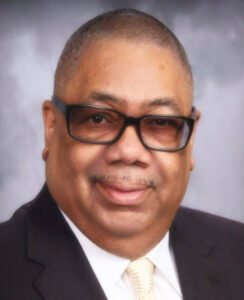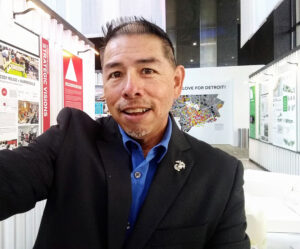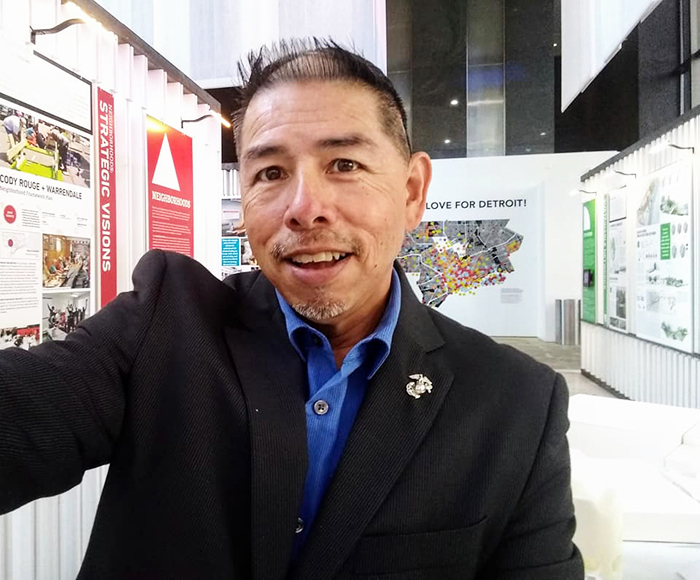
By Rev. Donald L. Perryman, Ph.D.
The Truth Contributor
Cities have the capability of providing something for everybody, only because, and only when, they are created by everybody.
– Jane Jacobs
Roberto Torres is back!!!
After years of impactful work in the Midwest from Cleveland and Canton, Ohio, to Detroit and Grand Rapids, Michigan, the northwestern Ohio native is now getting back into Toledo’s political arena to challenge incumbent Mayor Wade Kapszukiewicz in the March primary and, possibly, November’s general election.
In Toledo, Torres returns to a world he knows well: the city’s politics, community-building efforts and the fight for greater minority inclusion. Born and raised in northwest Ohio, Torres is ready to bring his expertise in economic development, minority inclusion and community advocacy to bear upon his hometown’s challenges.
I spoke with Torres, an Independent, to discuss his mayoral candidacy and commitment to using his experiences to improve the community.

Perryman: How did things start for Roberto Torres?
Torres: I was born and raised in northwest Ohio and grew up in a migrant camp as one of 13 children. My father, originally from Mexico, and my mother, from Texas, settled in Ohio after years of working in agricultural states like California, Oregon and Minnesota. After graduating from Swanton High School, I attended Bowling Green State University and served four years in the U.S. Marine Corps as a paralegal in the Judge Advocate’s office.
Perryman: Tell us about your professional experience.
Torres: My career began in administration at the Catholic Youth and School Services at the Diocese before I transitioned to public service, working for the City of Toledo in 1996. I held leadership roles such as director of the Youth Commission, Office of Latino Affairs and economic development manager. Working under Mayors Carty Finkbeiner and Jack Ford, I focused on creating opportunities for minority businesses. I was elected to the Toledo Public School Board in 2005, advocating for inclusion in the $700 million Building for Success Program.
In 2008, I became Canton’s director of economic development during the Great Recession, securing $1.8 billion in international investments. My career later took me to Cleveland, Grand Rapids and Detroit, where I led immigrant affairs and economic inclusion initiatives.
I’ve returned to Toledo to reengage with the community, address its challenges, and run for mayor, focusing on equity and opportunity for all.
Perryman: What prompted your decision to run for mayor?
Torres: The background that I had under Mayor Ford and Mayor Finkbeiner presented opportunities for Toledoans from all walks of life to be a part of the economic benefits of the city. The current administration has minimized many of those opportunities through policies and the work environment it supports.
Perryman: You commented in the media, describing your candidacy as “a campaign driven by the people.” Can you explain what that means?
Torres: It’s interesting because folks have said the current administration has all the union support and millions of dollars in resources to run for reelection. The one thing you can’t say is that they are not beholden to interest groups because they are. The current environment that we have that prevents minority contractors and minority businesses from opportunity is because of those interest groups.
When I say it’s “other people,” I mean that I’ve been encouraged by community members to seek this position. I haven’t gone out there to say I’m running because I have the endorsement by this interest group or that interest group; it’s not that. It will be a campaign where I’m listening to the individual voters and those who said we don’t have inclusion opportunities, whereas in the past, we did.
Perryman: You’ve spoken about neighborhood neglect; what specific policies or initiatives would you implement to address the issue?
Torres: One of the things I looked at when I came back was what economic development activity was happening right now in our neighborhoods. I realized that none of the CDCs I knew existed when I was working with Mayor Ford and Mayor Finkbeiner, and they were no longer around.
That’s one piece, and the other is the Block Watch program. The number of active organizations that the city relied on heavily to keep a public eye on what’s happening in the neighborhoods has declined. Community engagement and community activism have been missing, so that’s something that we would return to under my administration.
Perryman: You’ve also criticized the focus of the city’s new flag. What’s up with that?
Torres: The point is that we had two homicides in that week, and rather than speak about these incidents and go to the neighborhoods where it happened, there was the announcement of this new flag.
I’m not saying that the flag is not something that ought to be celebrated. What I’m simply saying is the incidents that occurred need to have some attention to it. I went out to the actual neighborhood where the homicide happened, and I spoke to the business owners. They were happy to have gotten a visit from someone who said, “Okay, this happened, and I’m glad you’re bringing attention to this.”
Perryman: A little while ago, Mayor Kapszukiewicz and Police Chief Troendle discussed the most recent crime trends. Auto theft is down 21 percent; homicides are down 18 percent. We’re lower than we were 30 years ago. Robbery is down five percent, motor vehicle theft is down 26 percent and then the number of people shot is down seven percent.
The data seems to conflict with what you’re saying. Hasn’t the mayor addressed that by coming out with the current report and implementing initiatives to show that we’re effectively addressing the crime in Toledo? What is your plan for reducing violence and improving public safety in Toledo?
Torres: I suggest contacting previous mayors to determine whether the crime report data is accurate. But, obviously, just from the outside looking in, I can’t tell you precisely what my plan would be. However, I can tell you that if you don’t have a community engaged in these conversations, you’re not being as effective as you can be.
Perryman: How do you intend to foster trust, collaboration and engagement between law enforcement and local communities?
Torres: Well, first, by being present. My understanding is that you need to have the leadership present in the community. How do you know what’s really happening if you’re not there listening to the residents in your community?
Perryman: Can you share examples from your time in Detroit, Grand Rapids, Canton or elsewhere where you successfully implemented policies to enhance public safety?
Torres: Well, I haven’t been a director of public safety; I’ve been a director of economic development. I can tell you where I’ve had job creation. I’ve been the director of immigrant affairs and economic inclusion. I can show you how I’ve grown the city’s population through housing and placement. I can tell you how many young people I’ve been able to support during my time as youth director and director of the youth entrepreneur program.
Perryman: OK. Let’s talk about economic development. According to studies, Toledo is ranked last for cities our size and larger for economic conditions for African American residents. What concrete steps would you take to address those economic disparities and improve inclusion?
Torres: One of the things I’ve recognized and worked on in other cities is that you can’t just rely on the traditional resources that a city receives. For example, you can’t just rely on CDBG, ESG, or home funds as the only funding that you have for development. A city has to be very aggressive about going out and identifying funds.
In Detroit, I made applications to get Choice Neighborhood dollars. In Canton, I made applications for brownfield grants to train individuals on remediation, and that bore fruit rather quickly because, during the time we were doing the training, there was a partnership between the city, workforce development and Stark State College. The country experienced the BP oil spill in the Gulf. Many of the students in our program were recruited and employed to go down to the oil spill to clean it. Many of them received employment with those environmental companies upon coming back.
There are ways in which a city can be more proactive about going out and getting more funds to spur economic development. Historic tax credits, for example. In many cases, cities rely on just the developers or an organization to do it. My experience has been that you go out there and get the funding. That funding will then attract developers to come in and create jobs or develop housing.
Perryman: Voters’ overwhelming passage of Issue 9 this past November allowed residents an opportunity to re-elect a mayor again for a third term. The charter amendment may indicate that Toledoans are skeptical about leadership changes. How would you reassure voters that you can deliver on your promises during your campaign?
Torres: I’ve done it with every city I’ve been in. I delivered at the Toledo Public School Board. I delivered in my positions when I was here with the city. Some of the young people I had on the Mayor Ford Youth Entrepreneur Program are assisting with the campaign.
I have a track record, and not just a track record here in Toledo. I have a track record in other communities to show community engagement, job creation, and neighborhood improvement, all of which have happened in positions where I’ve been in leadership.
Perryman: Finally, what other things are you doing in Toledo now that you are back in the game and at home?
Torres: I’m supporting minority contractors by finding contract opportunities with various institutions in northwest Ohio. It’s something that I did when I was with the Hispanic Chamber of Commerce and when I was with the city. However, 75 percent of the time is going out and engaging with the community. Since the campaign announcement, I’ve been applying all my time to engagement.
Contact Rev. Donald Perryman, PhD, at drdlperryman@centerofhopebaptist.org

